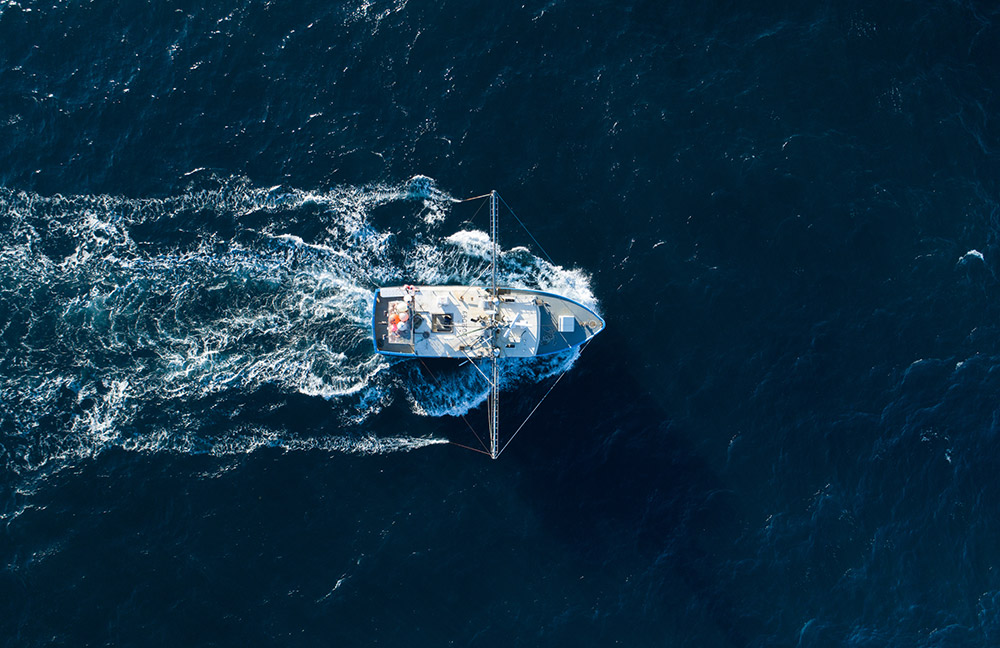
开普梅县境内水系密布,陆地不时会被特拉华湾和大西洋的潮水所淹没。
灯塔历史学家、漏斗蛋糕大师、冲浪教练、酒店管家、海岸警卫队成员、鲭鱼加工商、海洋生物学家、酒保和卖酒女郎等各色人群就在这里傍水而居。每到夏天,游客就会像潮水一样涌入,就像淹没陆地、贯通大洋和海湾的潮水一样,从不缺席。
在海边做海鲜生意的24岁的萨拉·布莱特是本地人。她做生意的地方是一个名叫瓦尔德伍德的小镇,这里以喧闹的木板路、宽阔的白色海滩和中世纪风格的霓虹灯而闻名。
她和父母住在开普梅法院附近,家中建有一个长满海草的池塘,池塘的年纪比她还大,而建造者则是她的父亲——商业渔民比尔。
如果你一年前告诉萨拉,2020年,52%的30岁以下的“新冠难民”将因疫情返回故乡,而她也会成为其中一员,回去与家人一起在海鲜行业工作,她会笑着说不可能,并告诉你“我的生活在科罗拉多州。”
萨拉和她的三个兄弟姐妹——26岁的泰斯、23岁的萨姆和20岁的威尔都是在故乡人工修建和潮汐冲刷形成的水道上长大的,以挖小帘蛤、抓螃蟹为乐,还会跟比尔一起出海捕鱼,帮助父亲比尔和母亲米歇尔经营自家备受欢迎的码头食品卡车——Hooked Up Seafood。
但高山和积雪把布莱特家的孩子都吸引到了西部。大学毕业后,泰斯在纽约待了一年,随后搬到丹佛,在一家拥有48个品牌的软件公司从事市场营销工作。
萨拉也跟着她的脚步走出了故乡,前往科罗拉多州发展,但却对投身大企业保持谨慎态度。
萨拉说:“我有很多朋友虽然找到了工作,但却并不开心,这也让我开始恐慌了起来。从小到大,我们一直被教育说要勇于冒险,生命应该多姿多彩,不应在无聊中虚度。”
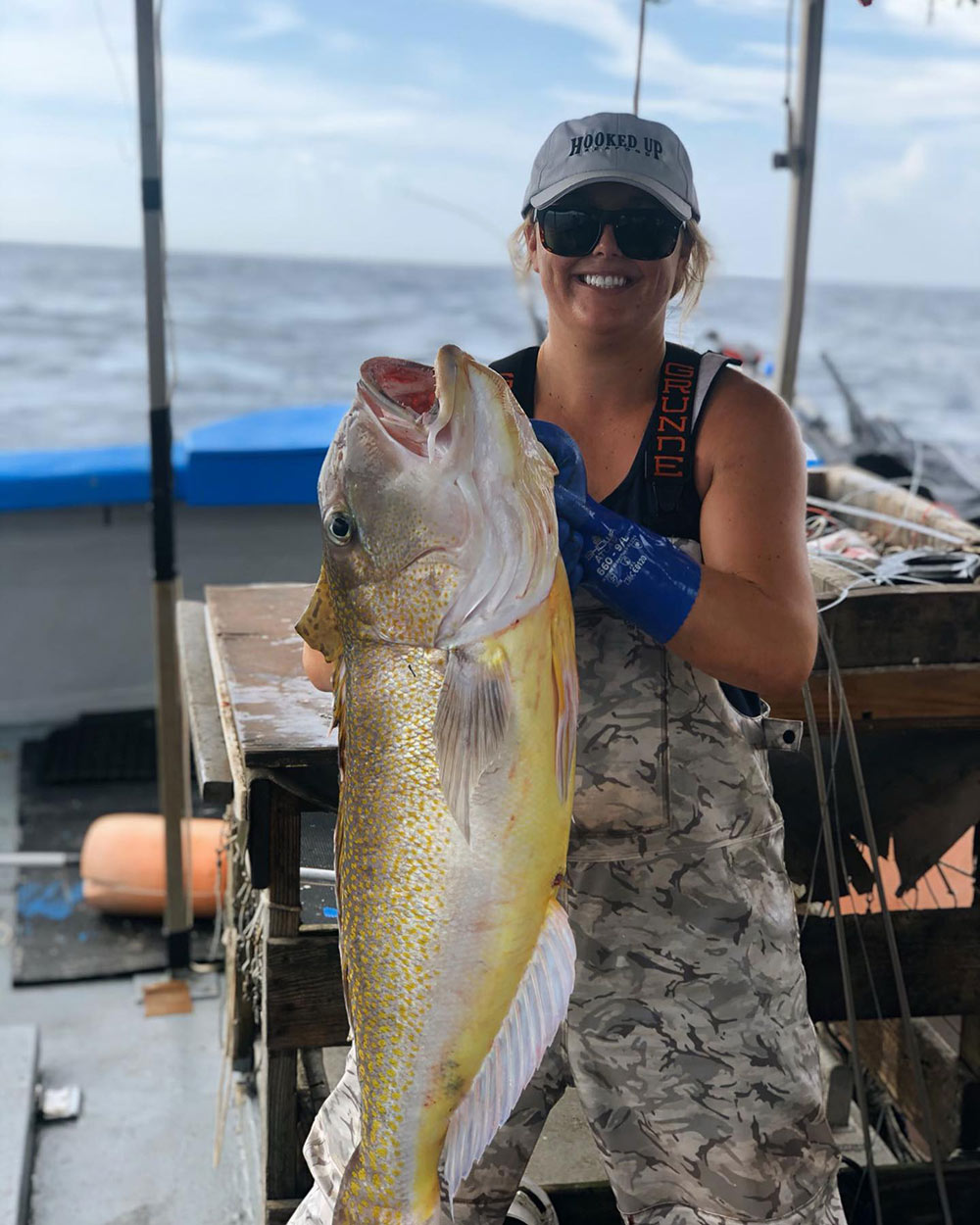
在科罗拉多寻觅了一个月之后,她最终在阿斯彭一家小酒馆找了一份兼职酒保的工作,因为镇上只有这家酒馆到午夜之前都会提供餐食,所以备受兼职人群的欢迎。
她白天滑雪,晚上赚钱,每天从酒馆出来时口袋里都装满了小费,可达800到1000美元之多。酒保和服务生的工作她都做,自己布置房间,不放过每一次加班的机会:对于布莱特家的人来说,做得比别人多、比别人好,几乎可以说是默认配置。
但疫情爆发后,阿斯彭的旅游业迅速崩盘。
因为一直有储蓄习惯,所以萨拉得以坚持到了八月,她表示,“我当时每天都在徒步旅行,做着各种各样有意思的事情,但总觉得没有满足感,(除了管理2000英里外的Hooked Up Seafood的社交媒体)有时好像自己的大脑被荒废了一样。于是我就开始思考如何才能改进Hooked Up,实现业务升级。”
也就是在这时,Hooked Up Marketplace开始成型,并最终吸引她回到故乡。
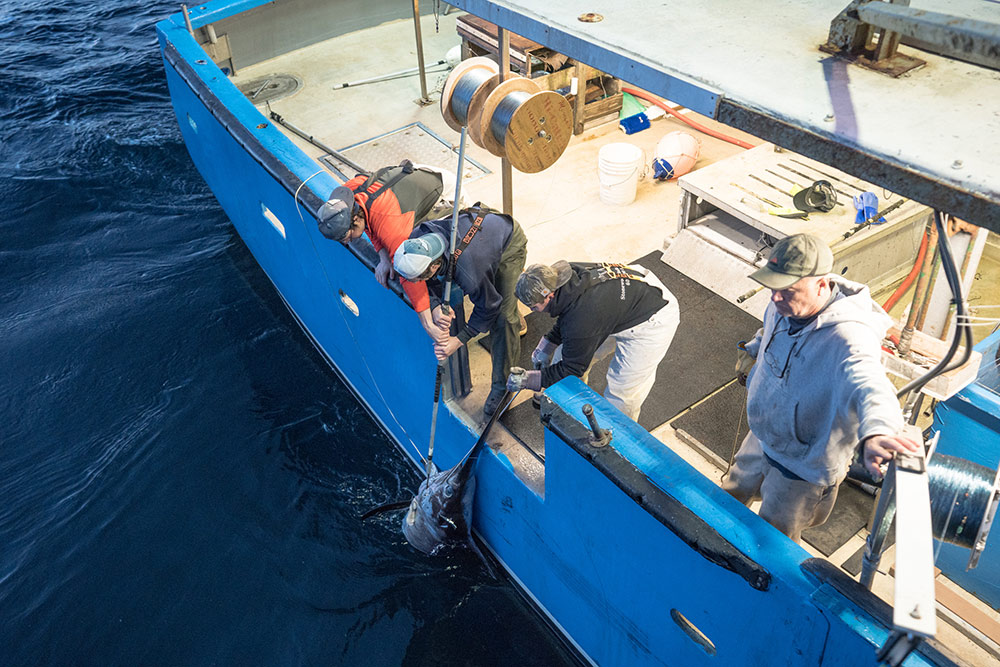
当孩子们还小的时候,比尔经常出海捕鱼,据其介绍,“一年大概有150天是在海上”。
某个星期天,他从新英格兰捕鱼回来,把全家人聚在桌旁,提出了创业开家餐馆的想法。确切的说也不是一家传统意义上的餐馆,而是餐车厨房。餐车位于理查德森海峡码头,近旁布置些野餐桌,处理渔获的地方就在几英尺外,食材的新鲜度肉眼可见。
“孩子们马上就喜欢上了这项工作。”
母亲米歇尔是新闻专业出身,而父亲比尔是顶级家庭厨师,2010年,两人一同创办了Hooked Up Seafood,并迅速打响了名头。
开普梅三面环水,且为东海岸第二大商业渔港所在地。他们坚持使用当地水产,并极为注重食材的新鲜度,与周边许多同行形成了鲜明对比。
虽然特拉华湾牡蛎和开普梅扇贝在镇上的菜单上相当常见,但消暑游客在当地户外甲板和海边酒馆所享用的水产往往是廉价的冷冻进口货。人们注意到了这种差异,而Hooked Up也凭借着良好的口碑逐渐发展了起来。
“但我们做这件事从来都不是为了赚钱,”比尔说,“更多的是希望能和孩子们一起,真正度过一些高质量的时光。”
作为高中生,看着自己的朋友在海滩上玩水上摩托,泰斯、萨拉、萨姆和威尔可能不会把在32摄氏度的天气里驾驶轮船、剥玉米穗或收拾一盘盘的螃蟹碎块看作是高质量的家庭时光。
但他们的父母强调,“重点不在于你个人,而在于我们的整个团队。在繁忙的假日周末,一切都有条不紊地运转,大家各司其职,正是我们团队表现优异的真正原因。陪伴家人,看着家人解决问题、协同工作,是我做过的最有价值的事情之一。”
无论如何,经营Hooked Up都是件非常辛苦的工作,而随着孩子们走上他们各自的道路,经营也变得越发困难:泰斯和萨拉去了科罗拉多,萨姆去年5月毕业拿到机械工程学位之后,在麋鹿狩猎季到俄勒冈找了一份装配工的工作;而威尔,作为优秀高中毕业生、罗文大学大二学生,则想要四处旅行。
萨拉说:“随着我们一个个离开Hooked Up,爸爸也开始招进其它员工,但他会觉得‘这不是我想要的状态。我想和家人一起工作,每天都能跟大家见面,跟其他孩子一起工作没法做到这一点。’”
加上又碰上了新冠疫情,比尔和米歇尔甚至觉得Hooked Up的生意可能会在2020年夏天拉下帷幕。
“萨拉和我一直都在说,这份生意对我们家而言具有特别意义,”泰斯说,“我们不想让它消失。我们不仅可以卖蟹饼三明治和新鲜鱼肉拼盘,还可以推出一些新业务,在赚钱的同时对社区发挥更大的作用。”
萨拉匆匆制定了商业计划,劳动节刚过就搬回了家。按照规划,Hooked Up Marketplace将单独负责零售业务,并重点介绍水产的相关信息,比如产地信息和烹饪方法。
萨拉、泰斯和他们34岁的表亲马特·戴利,一位来自费城外的供应链专家,将担任领导职位。新公司将利用Hooked Up的忠实客户,通过快闪店、农贸市场和订货等形式,将季节性客户转化为全年客户。新公司将与比尔的渔船进行合作,但在经营上则是作为单独的实体。
泰斯说,“我爸一直说‘你们随便做,我不想掺和进来,’这挺有意思的,因为大家都知道他想跟我们一块做。他希望用这种方式,让我们把这个工作做成我们自己的项目。”
准备停当之后,他们现在需要做的就是拿出一件标志性产品了。
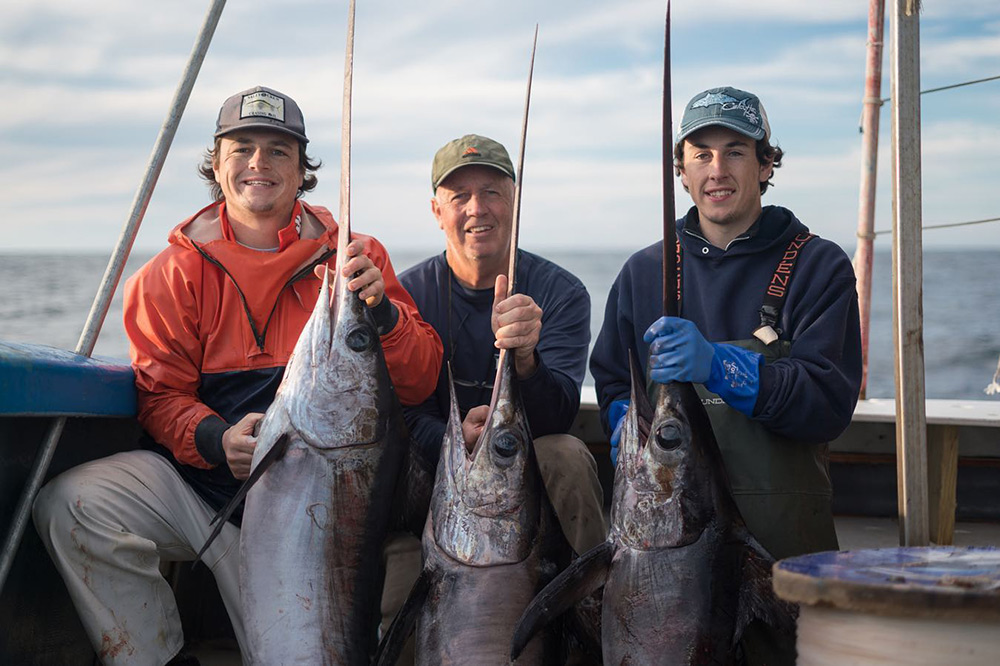
捕捞剑鱼从来都不是一件容易的事情,但在温暖的表层海水处还是相对容易一些。但由于上层海水的温度在夏季可达到27摄氏度之高,哪怕刚刚捕获,渔获其实已经错过了最佳温度。
考虑到大型船只经常要在海上航行多日,即使在船上进行速冻,渔获也很容易腐败变质。
“人们不喜欢剑鱼,是因为他们从来没有吃过好的剑鱼。一般情况下,剑鱼可能都要捕获两周之后,才能送上消费者的餐桌。” 比尔说。
虽然也捕捞大眼金枪鱼、鲯鳅鱼和其他热门水产,但鱿鱼一直是比尔的主要目标,他也利用自己20年来捕捞鱿鱼积累的专业知识,解决了剑鱼质量不佳的问题。
鱿鱼通常生活在远离大陆架且寒冷、黑暗的贫乏水域,在纽约和哈特拉斯角之间,洋底直降1800英尺。但每天早上,鱿鱼就会像郊区居民到市中心上班一样,游到繁忙温暖的表层海面,以依赖阳光的浮游动物为食。
螳螂捕蝉,黄雀在后。
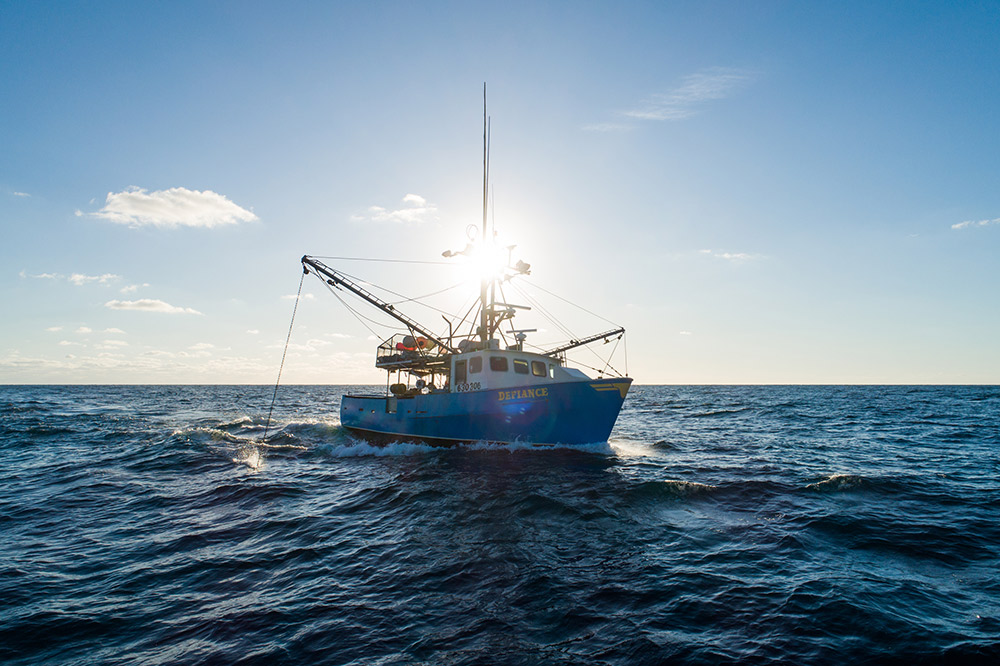
比尔想到,如果放上1200英尺到1500英尺的长线,在剑鱼开始上浮时,而不是在水面上捕捞剑鱼,质量会不会更好呢?
于是他便开始了测试,经过几次成功尝试之后,“我们意识到,在深海捕鱼不仅没有副渔获的干扰,而且渔获捞出水面时核心温度仅为10摄氏度,如同在冰箱中冷藏一般。”而比尔和他的船员则会全程确保渔获保持低温,就像“银子弹”啤酒一样。
比尔意识到,这种优质剑鱼排不仅可以供米歇尔在Hooked Up Seafood烹饪做菜,还可以成为他的拳头产品——质地优良、口味上佳、长期天然保鲜。
“我是东海岸第一个想把这种产品推向市场的人。”他给其起了一个朗朗上口的名字,“深水剑鱼(Deep Drop Swordfish)”,并委托萨拉、泰斯和马特通过Deep Drop Swordfish宣传产品故事,提高品牌认知度。
由于曾在迪法恩斯号上亲手将健硕的剑鱼拖上光滑的木质甲板,萨拉成了公司理想的品牌大使。
她说:“当我告诉别人我去捕捞剑鱼时,他们的反应通常是‘你跟他一块去?你喜欢出海捕鱼么?’商业渔业中,亲手捕鱼的女性并不多。”(在美国最大的渔业州阿拉斯加州,只有15%捕鱼许可证的持有者是女性,并且渔业普遍存在性骚扰问题。)
“社会在男女所能从事的工作上划分了界限,但我们的父母(在抚养我们的过程中)并未对儿女区别对待,而是给了我们同样的空间。”
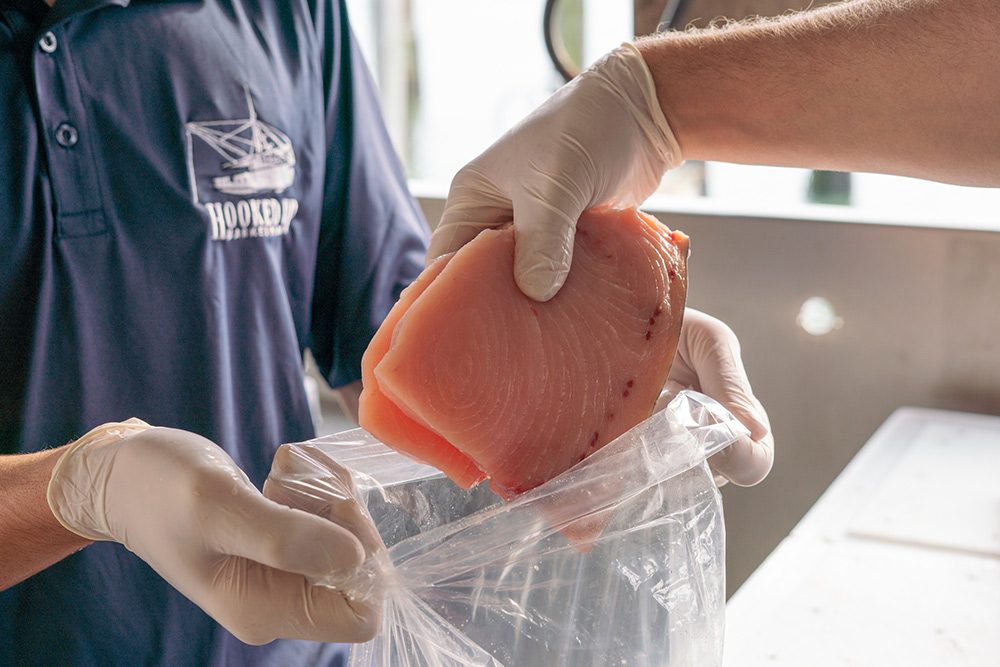
9月18日,萨拉如常在Hooked Up的Instagram上发布季末告别文章,区别只在于,本次告别文章中还包括对Hooked Up Marketplace的介绍。
五个星期后,她发出了一张泰斯设计的宣传图,上面是“深海剑鱼”光彩夺目的鱼排产品。
“想要找到可以在家烹饪的令人惊叹的高品质海鲜吗?不用再找了,我们就是您的最佳选择,首次官方快闪销售活动即将开启!比尔船长将驾驶迪法恩斯号渔船,给您带来大西洋海岸最新鲜的‘深海剑鱼’,本地优品,不容错过!”
泰斯说:“开始时我们并没有多大的野心,但是市场非常火爆。”
去年秋季三次快闪销售活动的销售额都实现了100%的增长。由于泰斯目前还在丹佛,萨拉和马特就让威尔回来给家里帮忙。
威尔告诉萨拉:“别把我说的话告诉妈妈,但我真不明白为什么我还要去学校学工程学,我知道自己想干什么,我想跟你一块做生意。”
萨拉对此并不意外。“注册公司时,我把大家的名字都写上了,我很清楚,这两年或者未来的每一天,大家都会加入到这项事业之中。如果把大家的技能整合到一起,我们将会成为一支强大的团队。”(财富中文网)
译者:梁宇
审校:夏林
开普梅县境内水系密布,陆地不时会被特拉华湾和大西洋的潮水所淹没。
灯塔历史学家、漏斗蛋糕大师、冲浪教练、酒店管家、海岸警卫队成员、鲭鱼加工商、海洋生物学家、酒保和卖酒女郎等各色人群就在这里傍水而居。每到夏天,游客就会像潮水一样涌入,就像淹没陆地、贯通大洋和海湾的潮水一样,从不缺席。
在海边做海鲜生意的24岁的萨拉·布莱特是本地人。她做生意的地方是一个名叫瓦尔德伍德的小镇,这里以喧闹的木板路、宽阔的白色海滩和中世纪风格的霓虹灯而闻名。
她和父母住在开普梅法院附近,家中建有一个长满海草的池塘,池塘的年纪比她还大,而建造者则是她的父亲——商业渔民比尔。
如果你一年前告诉萨拉,2020年,52%的30岁以下的“新冠难民”将因疫情返回故乡,而她也会成为其中一员,回去与家人一起在海鲜行业工作,她会笑着说不可能,并告诉你“我的生活在科罗拉多州。”
萨拉和她的三个兄弟姐妹——26岁的泰斯、23岁的萨姆和20岁的威尔都是在故乡人工修建和潮汐冲刷形成的水道上长大的,以挖小帘蛤、抓螃蟹为乐,还会跟比尔一起出海捕鱼,帮助父亲比尔和母亲米歇尔经营自家备受欢迎的码头食品卡车——Hooked Up Seafood。
但高山和积雪把布莱特家的孩子都吸引到了西部。大学毕业后,泰斯在纽约待了一年,随后搬到丹佛,在一家拥有48个品牌的软件公司从事市场营销工作。
萨拉也跟着她的脚步走出了故乡,前往科罗拉多州发展,但却对投身大企业保持谨慎态度。
萨拉说:“我有很多朋友虽然找到了工作,但却并不开心,这也让我开始恐慌了起来。从小到大,我们一直被教育说要勇于冒险,生命应该多姿多彩,不应在无聊中虚度。”
在科罗拉多寻觅了一个月之后,她最终在阿斯彭一家小酒馆找了一份兼职酒保的工作,因为镇上只有这家酒馆到午夜之前都会提供餐食,所以备受兼职人群的欢迎。
她白天滑雪,晚上赚钱,每天从酒馆出来时口袋里都装满了小费,可达800到1000美元之多。酒保和服务生的工作她都做,自己布置房间,不放过每一次加班的机会:对于布莱特家的人来说,做得比别人多、比别人好,几乎可以说是默认配置。
但疫情爆发后,阿斯彭的旅游业迅速崩盘。
因为一直有储蓄习惯,所以萨拉得以坚持到了八月,她表示,“我当时每天都在徒步旅行,做着各种各样有意思的事情,但总觉得没有满足感,(除了管理2000英里外的Hooked Up Seafood的社交媒体)有时好像自己的大脑被荒废了一样。于是我就开始思考如何才能改进Hooked Up,实现业务升级。”
也就是在这时,Hooked Up Marketplace开始成型,并最终吸引她回到故乡。
当孩子们还小的时候,比尔经常出海捕鱼,据其介绍,“一年大概有150天是在海上”。
某个星期天,他从新英格兰捕鱼回来,把全家人聚在桌旁,提出了创业开家餐馆的想法。确切的说也不是一家传统意义上的餐馆,而是餐车厨房。餐车位于理查德森海峡码头,近旁布置些野餐桌,处理渔获的地方就在几英尺外,食材的新鲜度肉眼可见。
“孩子们马上就喜欢上了这项工作。”
母亲米歇尔是新闻专业出身,而父亲比尔是顶级家庭厨师,2010年,两人一同创办了Hooked Up Seafood,并迅速打响了名头。
开普梅三面环水,且为东海岸第二大商业渔港所在地。他们坚持使用当地水产,并极为注重食材的新鲜度,与周边许多同行形成了鲜明对比。
虽然特拉华湾牡蛎和开普梅扇贝在镇上的菜单上相当常见,但消暑游客在当地户外甲板和海边酒馆所享用的水产往往是廉价的冷冻进口货。人们注意到了这种差异,而Hooked Up也凭借着良好的口碑逐渐发展了起来。
“但我们做这件事从来都不是为了赚钱,”比尔说,“更多的是希望能和孩子们一起,真正度过一些高质量的时光。”
作为高中生,看着自己的朋友在海滩上玩水上摩托,泰斯、萨拉、萨姆和威尔可能不会把在32摄氏度的天气里驾驶轮船、剥玉米穗或收拾一盘盘的螃蟹碎块看作是高质量的家庭时光。
但他们的父母强调,“重点不在于你个人,而在于我们的整个团队。在繁忙的假日周末,一切都有条不紊地运转,大家各司其职,正是我们团队表现优异的真正原因。陪伴家人,看着家人解决问题、协同工作,是我做过的最有价值的事情之一。”
无论如何,经营Hooked Up都是件非常辛苦的工作,而随着孩子们走上他们各自的道路,经营也变得越发困难:泰斯和萨拉去了科罗拉多,萨姆去年5月毕业拿到机械工程学位之后,在麋鹿狩猎季到俄勒冈找了一份装配工的工作;而威尔,作为优秀高中毕业生、罗文大学大二学生,则想要四处旅行。
萨拉说:“随着我们一个个离开Hooked Up,爸爸也开始招进其它员工,但他会觉得‘这不是我想要的状态。我想和家人一起工作,每天都能跟大家见面,跟其他孩子一起工作没法做到这一点。’”
加上又碰上了新冠疫情,比尔和米歇尔甚至觉得Hooked Up的生意可能会在2020年夏天拉下帷幕。
“萨拉和我一直都在说,这份生意对我们家而言具有特别意义,”泰斯说,“我们不想让它消失。我们不仅可以卖蟹饼三明治和新鲜鱼肉拼盘,还可以推出一些新业务,在赚钱的同时对社区发挥更大的作用。”
萨拉匆匆制定了商业计划,劳动节刚过就搬回了家。按照规划,Hooked Up Marketplace将单独负责零售业务,并重点介绍水产的相关信息,比如产地信息和烹饪方法。
萨拉、泰斯和他们34岁的表亲马特·戴利,一位来自费城外的供应链专家,将担任领导职位。新公司将利用Hooked Up的忠实客户,通过快闪店、农贸市场和订货等形式,将季节性客户转化为全年客户。新公司将与比尔的渔船进行合作,但在经营上则是作为单独的实体。
泰斯说,“我爸一直说‘你们随便做,我不想掺和进来,’这挺有意思的,因为大家都知道他想跟我们一块做。他希望用这种方式,让我们把这个工作做成我们自己的项目。”
准备停当之后,他们现在需要做的就是拿出一件标志性产品了。
捕捞剑鱼从来都不是一件容易的事情,但在温暖的表层海水处还是相对容易一些。但由于上层海水的温度在夏季可达到27摄氏度之高,哪怕刚刚捕获,渔获其实已经错过了最佳温度。
考虑到大型船只经常要在海上航行多日,即使在船上进行速冻,渔获也很容易腐败变质。
“人们不喜欢剑鱼,是因为他们从来没有吃过好的剑鱼。一般情况下,剑鱼可能都要捕获两周之后,才能送上消费者的餐桌。” 比尔说。
虽然也捕捞大眼金枪鱼、鲯鳅鱼和其他热门水产,但鱿鱼一直是比尔的主要目标,他也利用自己20年来捕捞鱿鱼积累的专业知识,解决了剑鱼质量不佳的问题。
鱿鱼通常生活在远离大陆架且寒冷、黑暗的贫乏水域,在纽约和哈特拉斯角之间,洋底直降1800英尺。但每天早上,鱿鱼就会像郊区居民到市中心上班一样,游到繁忙温暖的表层海面,以依赖阳光的浮游动物为食。
螳螂捕蝉,黄雀在后。
比尔想到,如果放上1200英尺到1500英尺的长线,在剑鱼开始上浮时,而不是在水面上捕捞剑鱼,质量会不会更好呢?
于是他便开始了测试,经过几次成功尝试之后,“我们意识到,在深海捕鱼不仅没有副渔获的干扰,而且渔获捞出水面时核心温度仅为10摄氏度,如同在冰箱中冷藏一般。”而比尔和他的船员则会全程确保渔获保持低温,就像“银子弹”啤酒一样。
比尔意识到,这种优质剑鱼排不仅可以供米歇尔在Hooked Up Seafood烹饪做菜,还可以成为他的拳头产品——质地优良、口味上佳、长期天然保鲜。
“我是东海岸第一个想把这种产品推向市场的人。”他给其起了一个朗朗上口的名字,“深水剑鱼(Deep Drop Swordfish)”,并委托萨拉、泰斯和马特通过Deep Drop Swordfish宣传产品故事,提高品牌认知度。
由于曾在迪法恩斯号上亲手将健硕的剑鱼拖上光滑的木质甲板,萨拉成了公司理想的品牌大使。
她说:“当我告诉别人我去捕捞剑鱼时,他们的反应通常是‘你跟他一块去?你喜欢出海捕鱼么?’商业渔业中,亲手捕鱼的女性并不多。”(在美国最大的渔业州阿拉斯加州,只有15%捕鱼许可证的持有者是女性,并且渔业普遍存在性骚扰问题。)
“社会在男女所能从事的工作上划分了界限,但我们的父母(在抚养我们的过程中)并未对儿女区别对待,而是给了我们同样的空间。”
9月18日,萨拉如常在Hooked Up的Instagram上发布季末告别文章,区别只在于,本次告别文章中还包括对Hooked Up Marketplace的介绍。
五个星期后,她发出了一张泰斯设计的宣传图,上面是“深海剑鱼”光彩夺目的鱼排产品。
“想要找到可以在家烹饪的令人惊叹的高品质海鲜吗?不用再找了,我们就是您的最佳选择,首次官方快闪销售活动即将开启!比尔船长将驾驶迪法恩斯号渔船,给您带来大西洋海岸最新鲜的‘深海剑鱼’,本地优品,不容错过!”
泰斯说:“开始时我们并没有多大的野心,但是市场非常火爆。”
去年秋季三次快闪销售活动的销售额都实现了100%的增长。由于泰斯目前还在丹佛,萨拉和马特就让威尔回来给家里帮忙。
威尔告诉萨拉:“别把我说的话告诉妈妈,但我真不明白为什么我还要去学校学工程学,我知道自己想干什么,我想跟你一块做生意。”
萨拉对此并不意外。“注册公司时,我把大家的名字都写上了,我很清楚,这两年或者未来的每一天,大家都会加入到这项事业之中。如果把大家的技能整合到一起,我们将会成为一支强大的团队。”(财富中文网)
译者:梁宇
审校:夏林
Water is everywhere in Cape May County, and land is borrowed space the loan sharks of the Delaware Bay and Atlantic Ocean periodically reclaim without eviction notice. People who make their livings here—lighthouse historians, funnel cake artists, surf instructors, hotel housekeepers, Coast Guard officers, mackerel processors, marine biologists, barbacks, and shot girls—do so because of and in spite of the water, and the tourism water brings every summer, reliable as the tides that flood and drain the saltwater marshes that stitch together ocean and bay.
Twenty-four-year-old Sara Bright is one of these people. She sells seafood by the seashore, in Wildwood more specifically, a town famous for its rambunctious boardwalk, wide white beaches, and midcentury neon. She lives with her parents in nearby Cape May Courthouse on a seagrass-fringed pond her commercial fisherman father, Bill, dug before she was born. If you told Sara a year ago that she’d be among the 52% of pandemic refugees under 30 that moved back home in 2020, and that she’d be working with her family in the seafood industry, “I would have laughed and said no way, my life is in Colorado.”
Sara and her three siblings—Tess, 26, Sam, 23, and Will, 20—grew up on the Cape’s man-made and moon-made waterways, digging littlenecks, catching crabs, going on fishing trips with Bill, and helping him and their mom, Michelle, run Hooked Up Seafood, the family’s acclaimed dockside food truck. But the mountains and the snow pulled each Bright kid West. After college and a year in New York, Tess moved to Denver for a marketing job with a 48-brand software portfolio. Sara followed her, committed to Colorado but leery of the corporate world. “A lot of my friends were getting jobs but weren’t happy, and I started to panic,” Sara says. “Growing up we were taught to chase adventure, and that life should be anything but boring.”
She explored Colorado for a month, eventually landing in Aspen and taking a bartending gig at the only tavern in town serving food till midnight, making it a favorite with the after-work industry crowd. She’d shred powder all day and stack paper at night, rolling out of her bar with her snowboarding jacket pockets swollen with $800 to $1000 in tips. She’d do double duty as bartender and server, working the room herself, and pick up every extra shift available; outworking everyone else is pretty much the default Bright setting.
When the pandemic hit, Aspen’s tourism industry evaporated in 48 hours. Sara, a saver, rode it out till August. “I was hiking every day and doing all this amazing stuff, but I didn’t feel fulfilled or like I was using my brain on a daily basis,” outside of handling Hooked Up Seafood’s social media from 2,000 miles away. “I started thinking about how we could make Hooked Up better, how can we improve it,” and Hooked Up Marketplace, the business that would bring her back home, began to take shape.
When the Bright kids were young, Bill was away at sea often, “probably 150 days a year,” he says. One Sunday he came home from a fishing trip in New England, gathered the family around the table, and floated an idea for a new adventure—a restaurant. Well, not a restaurant-restaurant, but a kitchen trailer parked by the docks on Richardson Channel, with picnic tables where customers could see the freshness of the fish, guts and scales and all, being butchered a few feet away. “The kids were into it right away.”
Bill and Michelle, a Temple-trained journalist and ace home cook, opened Hooked Up Seafood in 2010 and quickly developed a reputation of excellence. Their commitment to fresh and local seafood stood in contrast to many of their neighbors, perhaps surprising given Cape May County is surrounded by water and home to the second largest commercial fishing port on the East Coast. But while Delaware Bay oysters and Cape May scallops make fairly common appearances on menus around town, the fish the summer crowds feast on in the area’s outdoor decks and nautical taverns are typically cheap, frozen, and imported. People noticed the difference, and the Hooked Up grew by word-of-mouth summer after summer. “But it was never about making money,” Bill says. “It was more about spending real, quality time with my kids.”
As high schoolers, Tess, Sara, Sam, and Will may not have viewed manning the steamer, shucking ears of corn, or bussing trays of pulverized crab carcasses on 90-degree days while their friends were at the beach on running jet skis as quality family time, but their parents emphasized, “It’s not about you, it’s about the team,” Bill says. “When you see that wheel in motion on a busy holiday weekend, and everybody knows their spot, that’s what makes our team really good. To stand there and watch my family solve problems and work as a team, it’s one of the most rewarding things I've ever done.”
Regardless, running Hooked Up is strenuous, and it’s gotten harder as the kids have gone their own ways: Tess and Sara in Colorado; Sam graduating last May with a mechanical engineering degree and moving to Oregon work as an outfitter during elk season; Will, a high school valedictorian and sophomore at Rowan looking for adventure. “When we started leaving and my dad started bringing other [employees] into Hooked Up,” Sara says, “he was like, ‘This isn't what I want. I wanted to work with my family. I wanted to see everybody every day, so working with other kids just doesn’t do it.’” Add a pandemic to the mix, and Bill and Michelle wondered if 2020 might be Hooked Up’s last summer.
“Sara and I had always talked about how our family has something special, and we didn’t want to let that die,” Tess says. “We knew there was something much bigger than selling crab cake sandwiches and fresh fish platters, that there might be a new business that could make money and have a greater [purpose] in the community.”
Sara banged out the business plan and moved home just after Labor Day. Hooked Up Marketplace would be a retail spin-off with focus on demystifying seafood—both where it comes from and how to cook it. Sara, Tess, and their 34-year-old cousin, Matt Daly, a supply-chain specialist outside Philly, would fill the leadership roles. The new company would leverage Hooked Up’s loyal clientele, converting seasonal customers into year-round ones through pop-ups, farmers’ markets, and subscriptions. It would work symbiotically with Bill’s boats but would operate as its own entity.
“My dad's entire thing was, ‘You guys do whatever you want; I don't want to be involved,’ which is kind of funny because he wants to be involved,” Tess says. “It’s his way of saying he wants this to be our own project.”
All they needed was a signature product.
Catching a swordfish is never easy, but it’s easier near the sun-warmed surface. Here in the upper water column the seas can be up to 80 degrees in the summertime, which is why a sword pulled from this environment will already be on the wrong side of optimal temperature. Given that large boats are often on multi-day trips, even a fish that is quickly chilled down on board is vulnerable to spoilage.
“The reason people don’t like swordfish is they’ve never had a good swordfish, because the average swordfish is probably at least two weeks old,” Bill says.
While he hunts big-eye tuna, mahi-mahi, and other underwater rock stars, squid has always been Bill’s bread and butter, and he leaned on his 20 years of expertise fishing the ten-legged darts to solve the subprime sword problem. Squid thrive in the cold, dark, sparsely populated waters off the Continental Shelf, where the ocean floor plummets 1800 feet between New York and Cape Hatteras, but every morning, they commute like suburbanites to the busy warmer surface water to feed on sunlight-dependent zooplankton. Predators pursue.
Bill tested a theory: Instead of catching sword at the surface, what if he dropped a longer line—a 1,200- to 1,500-foot line—and sought the spear-nosed marauders at the start of their ascent. After a few successful attempts, “We realized by fishing them down there, not only is there zero bycatch, but when you bring the fish up it has a core temp of 50 degrees. It’s already refrigerated,” and Bill and his crew maintain that cold temperature through every step of the process. It’s the Coors Lite of fish.
Bill realized he didn’t just have superior sword steaks for Michelle to blacken at Hooked Up Seafood. He had a product, one with a sublime texture and flavor and a naturally long shelf life, “and I’m the first person on the East Coast to seek to market it.”He gave it the catchy name, Deep Drop Swordfish, and entrusted Sara, Tess, and Matt to communicate the story and nurture brand recognition through Hooked Up Marketplace.
With her first-hand experience on Defiance, hauling the powerful swords onto the slick wooden deck, Sara is an ideal ambassador. “When I tell people I go out swordfishing they’re like, ‘You go out with him?’ You enjoy that?’” she says. “There aren’t many women in commercial fishing doing the hands-on work.” (Women hold only about 15% of fishing permits in Alaska, the state with the largest fishing industry in the country, and sexual harassment is endemic in the industry.) “Society separates women and men into what they can and can’t do, but my parents [raised us] with no separation between the possibilities for the daughters and the sons.”
On September 18, Sara posted the usual seasonal farewell on Hooked Up’s Instagram feed and included an introduction to Hooked Up Marketplace. Five weeks later, she posted a flyer Tess had designed featuring the pearlescent slabs of Deep Drop Swordfish.
“Looking for amazing high-quality seafood you can cook at home? Look no further, we’re having our first official pop-up sale! Captain Bill and the F/V Defiance are on their way in from their latest Atlantic seaboard trip with fresh off-the-boat locally caught Deep Drop Swordfish.”
“I don’t think we were expecting a lot,” Tess says, “but the interest was overwhelming,” with sales growing 100% across each of three pop-ups this fall. With Tess still in Denver for the time being, Sara and Matt called Will in to help.
“Don’t tell mom when I say this,” Will told Sara, “but I don’t know why I’m going to school for engineering, because I know what I want to do—own a business and own it with you.”
Sara wasn’t surprised. “I put everybody’s name on the LLC because I knew that at one point, whether it's this year, next year, or two years from now, that it’s going to be all of us. If you take all of our skill sets and align them and then put them together, we have a power team.”






